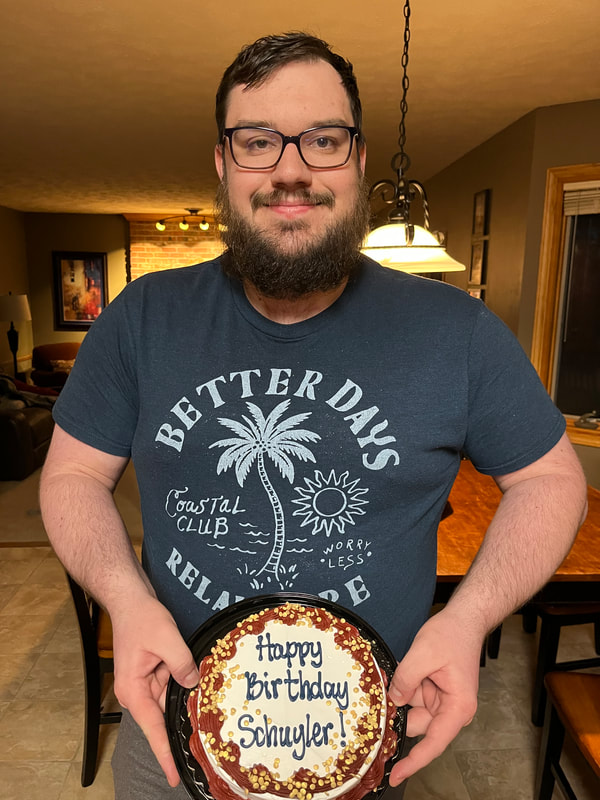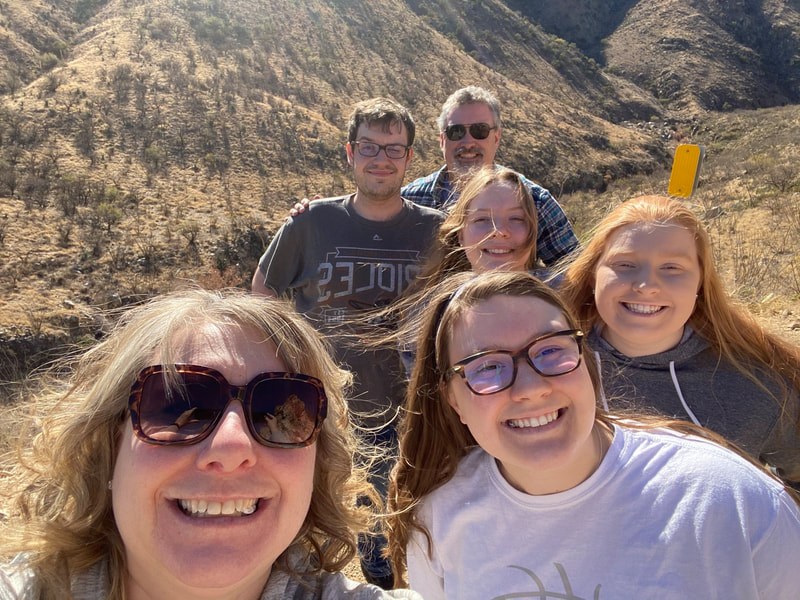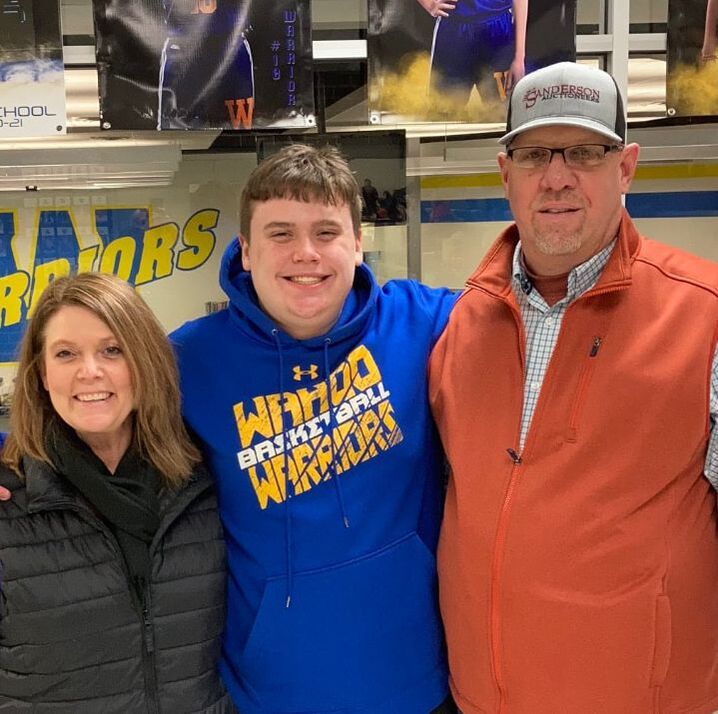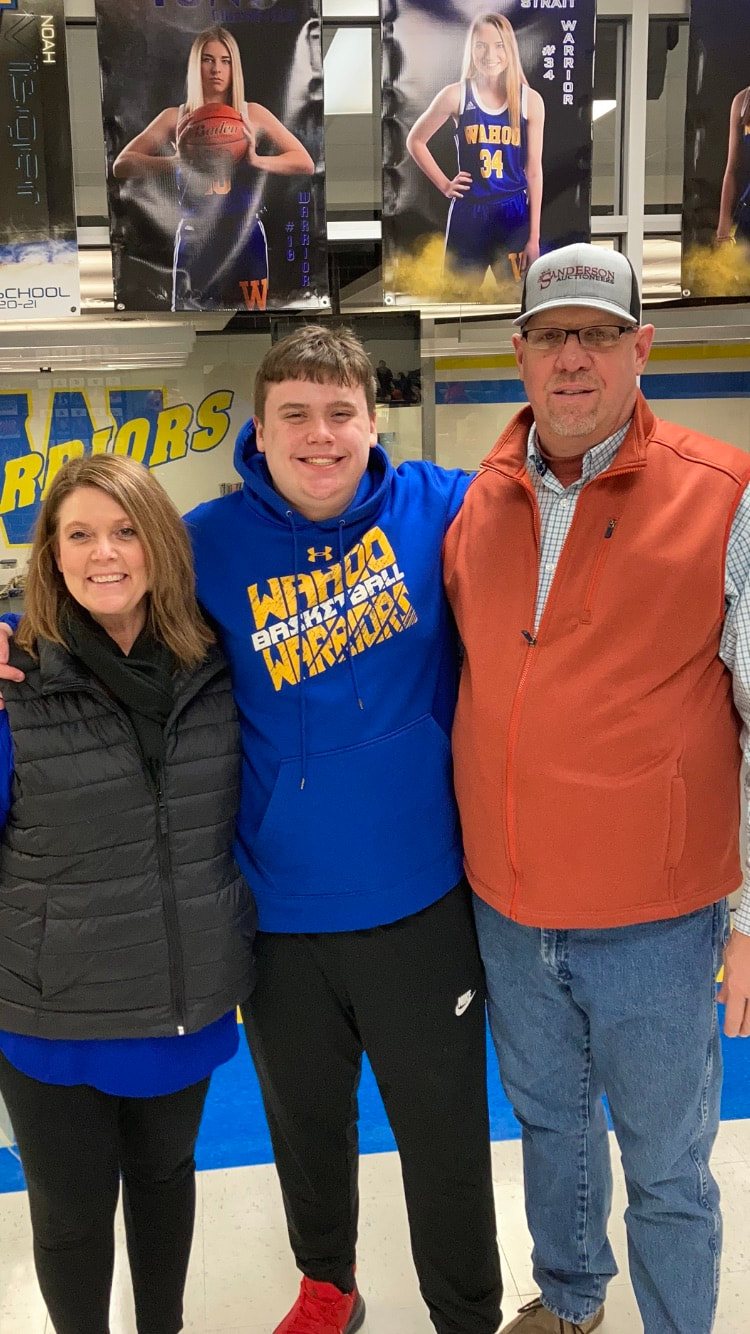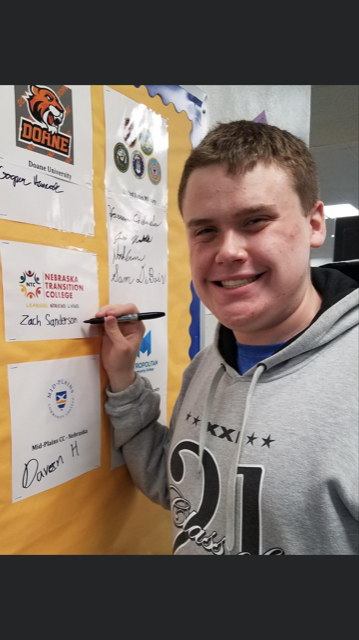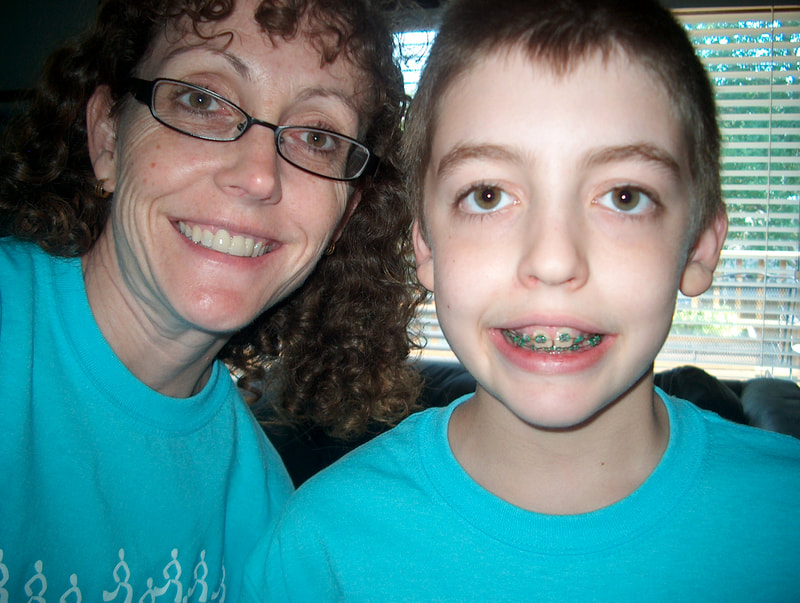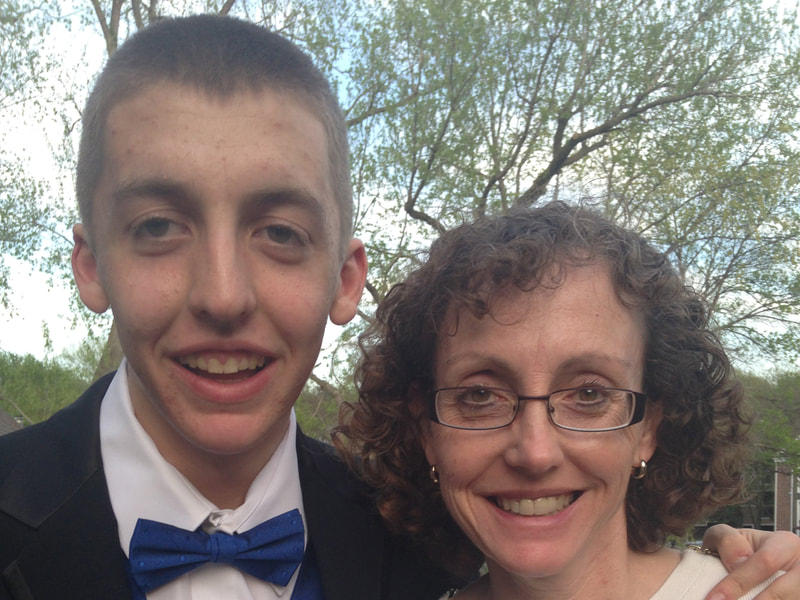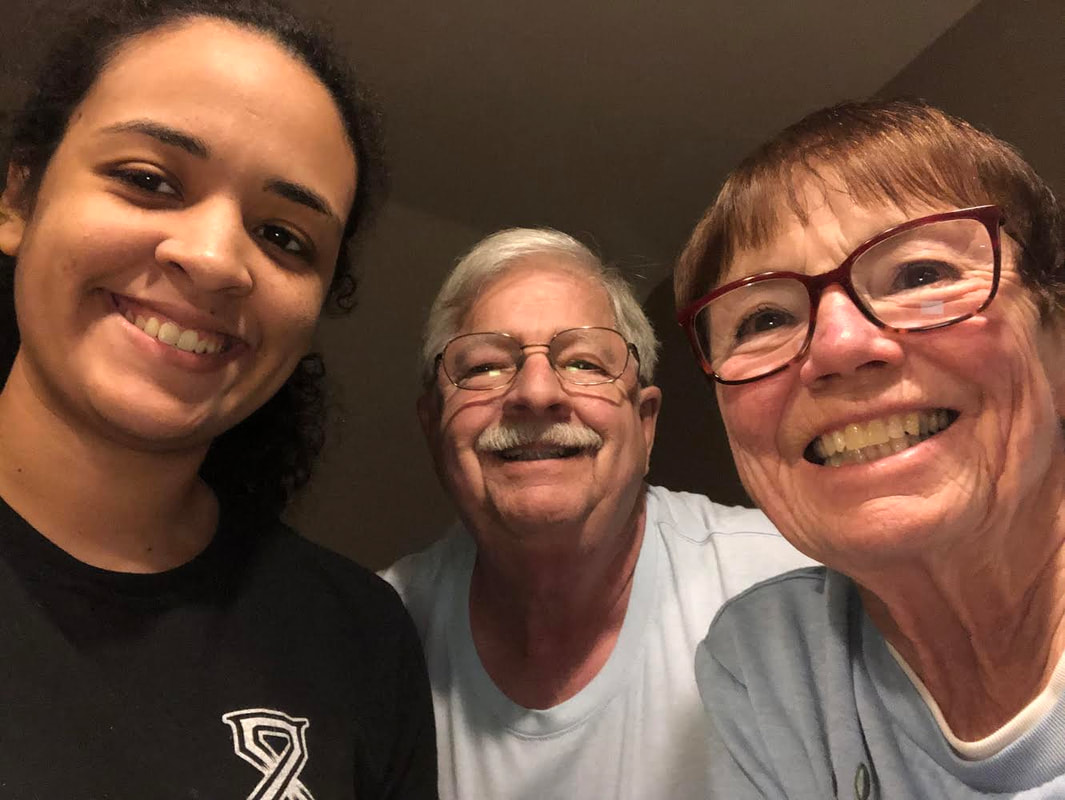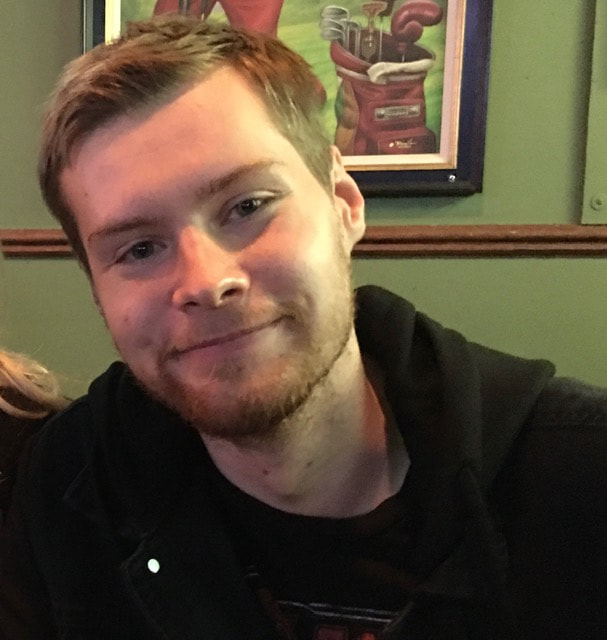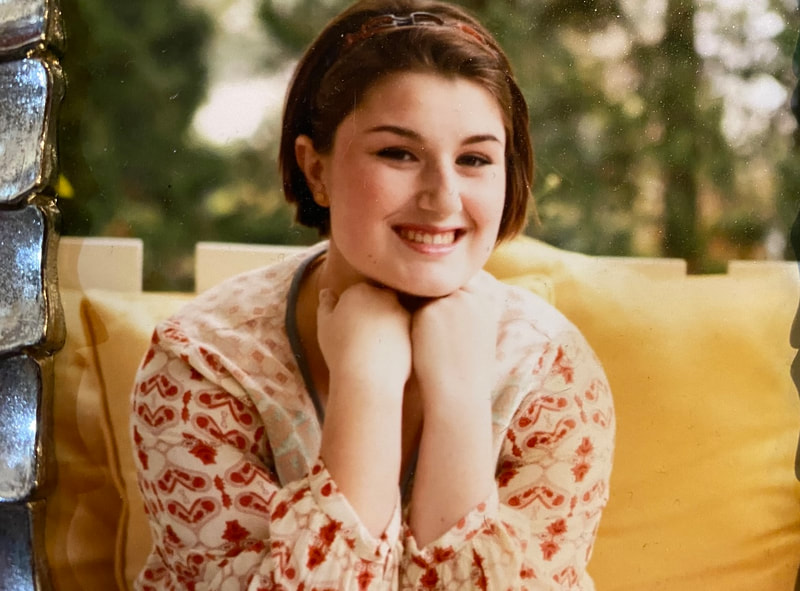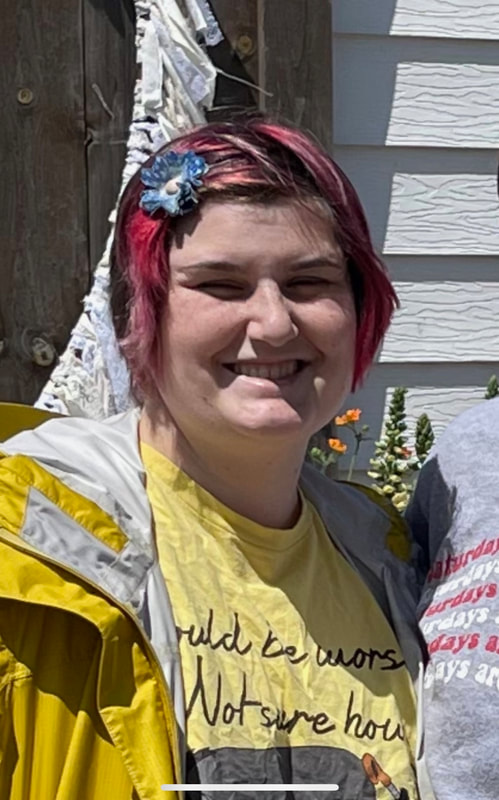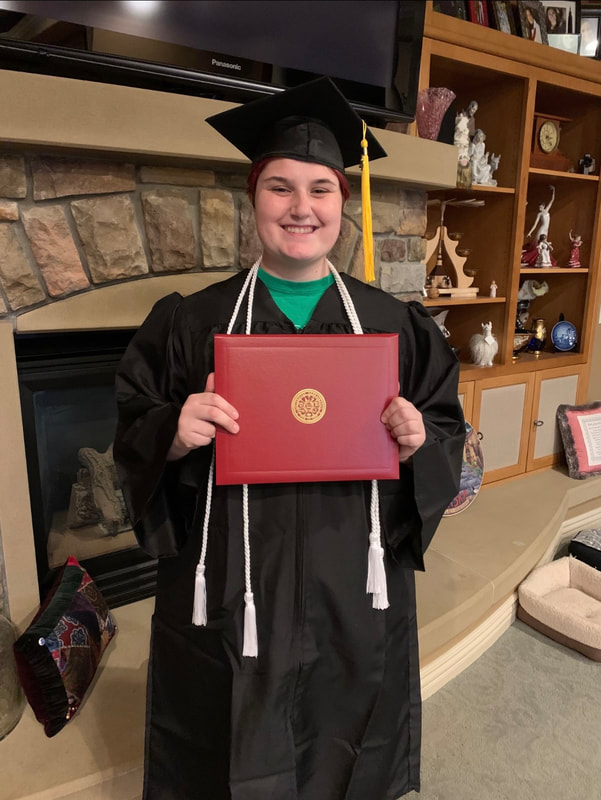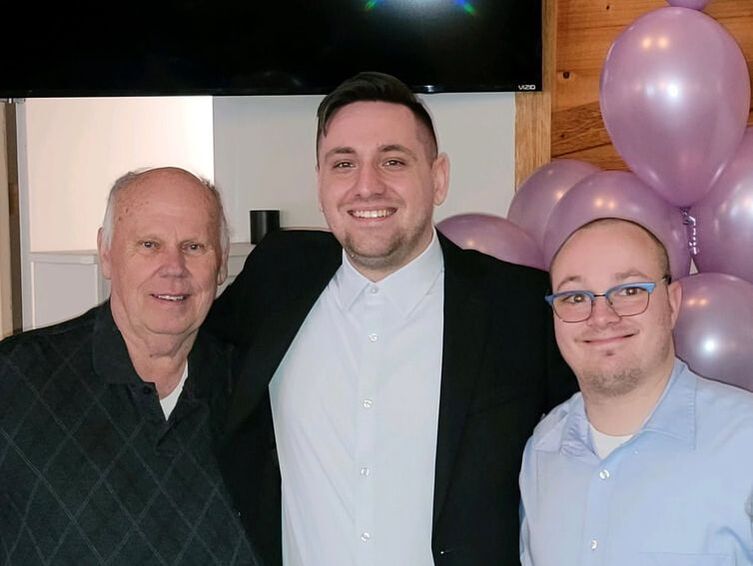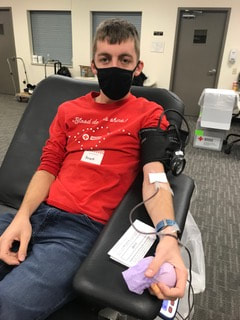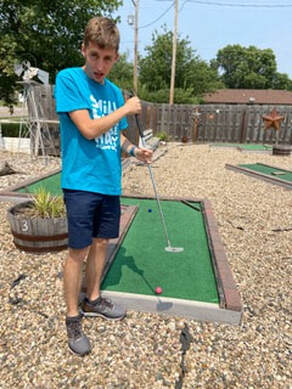Student and Parent Profile: Schuyler Krinke,
Jeff and Kathy Krinke
Total frustration. That is what it has been like trying to get our son help when he is a high functioning young boy and now man with Asperger’s, Depression, and Anxiety. Over the years, we took him to many doctors, psychologists, counselors, speech pathologists, etc. and though one therapist said he had organizational dysfunction, we knew there was something else. He wasn’t officially diagnosed until he was around 20 years old.
Read more
As a toddler, there were a few things that stood out to us about Schuyler: his inability to entertain himself, and the fact that he never wanted to try a new toy or anything unless he watched someone else use it over and over and over. In lower elementary, he was very “touchy-feely” with his friends, stuttered a lot, but read very well and could spell long words very quickly. By the time he was in Jr. High/High School the frustration really started. Even though we knew he was a smart and good kid, he didn’t have a lot of friends, did not take care of himself or his surroundings, had trouble getting his homework done, wasn’t reliable, had trouble getting up and getting to school and work on time, etc. He was an excellent pitcher in baseball and a wonderful percussionist in the school band but once met with conflict or a situation he didn’t like, he would shut down.
Schuyler did graduate high school and spent one semester in college where everything officially fell apart. Since then he has tried countless jobs and most ended because of his ability to complete tasks at work or showing up late or not at all. Even after being diagnosed with Asperger’s, he has been denied any help or Social Security (twice now) because they all say he is too high functioning. Help was hard to find and even when we did, it took months or years to get it. Then this past winter he was diagnosed with a very severe case of Graves’ disease and although he is better, he hasn’t worked since. His confidence is at an all-time low.
Like most parents, all we want is for Schuyler to be self-sufficient, hold a job, be a positive contributor of society and be happy. He cannot do that on his own. Finally we heard from a few people about Nebraska Transition College.
Hope.
Schuyler loves that the classes are on line and seems to be pretty responsible about zooming in for class or contacting his teachers and catching up for the next class. He is most excited about the prospect of getting an apartment after the completion of the classes and getting help with being on his own with someone besides his parents.
Though NTC is still early on in its creation, we couldn’t ask for a better fit for our son’s needs in regards to classes. It’s very affordable due to generous donors and the goal is that they actually work with the students to get them where they need to be in life in order to be successful. We cannot wait to see where NTC takes our son!
Jeff and Kathy Krinke
Schuyler did graduate high school and spent one semester in college where everything officially fell apart. Since then he has tried countless jobs and most ended because of his ability to complete tasks at work or showing up late or not at all. Even after being diagnosed with Asperger’s, he has been denied any help or Social Security (twice now) because they all say he is too high functioning. Help was hard to find and even when we did, it took months or years to get it. Then this past winter he was diagnosed with a very severe case of Graves’ disease and although he is better, he hasn’t worked since. His confidence is at an all-time low.
Like most parents, all we want is for Schuyler to be self-sufficient, hold a job, be a positive contributor of society and be happy. He cannot do that on his own. Finally we heard from a few people about Nebraska Transition College.
Hope.
Schuyler loves that the classes are on line and seems to be pretty responsible about zooming in for class or contacting his teachers and catching up for the next class. He is most excited about the prospect of getting an apartment after the completion of the classes and getting help with being on his own with someone besides his parents.
Though NTC is still early on in its creation, we couldn’t ask for a better fit for our son’s needs in regards to classes. It’s very affordable due to generous donors and the goal is that they actually work with the students to get them where they need to be in life in order to be successful. We cannot wait to see where NTC takes our son!
Jeff and Kathy Krinke
Parent Profile: Patty Sanderson
|
Autism: Where the ‘randomness of life collides and clashes with an individual’s need for sameness.
-Ellen Miller If Autism has shown us anything, it’s to keep moving forward and to find our own boxes to check. When Zach was born, we had adopted his brother, Ben, and he came home just 6 months before Zach was born, so we were still very much figuring our parenthood. Things seemed to be going along typically. It was when I returned to work, and he was at day care that I started to feel things were different. The day care said he would lay down for his nap, but when he woke up, he would not cry. He would be content to lay in the crib all day. Zach needed some pushing to do activities as a baby and into toddlerhood. |
Read more
When Zach was a toddler, (around 2) he was starting to have more behavior challenges - screaming or hitting when he asked to do things, for example. He also was biting a lot. We didn’t find out until later he had the need for oral stimulation. As the behaviors continued, I mentioned our challenges to a co-worker who is a speech pathologist, and she asked if she could do some testing with Zach. After the testing, she recommended we make an appointment with Munroe- Meyer for further testing.
When we went to Munroe-Meyer, it was a very stressful and long day. We met with a speech pathologist, a psychologist, and a medical doctor, and at the end of the day, Zach was diagnosed with Optional Defiant Disorder. My first thought was, “what is this and how do we fix it?” We were initially connected with a psychologist, and we started with ‘play’ techniques that allowed us to learn how best to interact with Zach. We also met regularly with a psychiatrist at Munroe- Meyer who at that time diagnosed Zach with autism, and Zach was put on medications at that time to help with behaviors.
We started Head Start when Zach was 4. The extra stimulation and demands put on him in that environment was a challenge. He needed 1:1 support to get through the day. We completed Head Start, and it was time to start Kindergarten. This was the point at which our world would be turned upside down.
I assumed that the kindergarten teachers were prepared for Zach. His Head Start class was across the hall and I knew they had seen some of Zach’s many behaviors during the Head Start years. I remember very distinctly that first day; just thinking about it still makes my stomach hurt. It was an ordeal just getting him physically into the school. He got into his classroom and the teacher said he would be fine. I left for work. In returning after school, I was met at the door by the teacher. Her first words were, “your son needs 1:1 support”.
No kidding!
When we went to Munroe-Meyer, it was a very stressful and long day. We met with a speech pathologist, a psychologist, and a medical doctor, and at the end of the day, Zach was diagnosed with Optional Defiant Disorder. My first thought was, “what is this and how do we fix it?” We were initially connected with a psychologist, and we started with ‘play’ techniques that allowed us to learn how best to interact with Zach. We also met regularly with a psychiatrist at Munroe- Meyer who at that time diagnosed Zach with autism, and Zach was put on medications at that time to help with behaviors.
We started Head Start when Zach was 4. The extra stimulation and demands put on him in that environment was a challenge. He needed 1:1 support to get through the day. We completed Head Start, and it was time to start Kindergarten. This was the point at which our world would be turned upside down.
I assumed that the kindergarten teachers were prepared for Zach. His Head Start class was across the hall and I knew they had seen some of Zach’s many behaviors during the Head Start years. I remember very distinctly that first day; just thinking about it still makes my stomach hurt. It was an ordeal just getting him physically into the school. He got into his classroom and the teacher said he would be fine. I left for work. In returning after school, I was met at the door by the teacher. Her first words were, “your son needs 1:1 support”.
No kidding!
This was the start of two months of hell. Different strategies were tried with Zach (e.g. many placements of his desk, a quiet room to work in, etc.). He was expelled twice from school during those two months due to hitting. He did not understand his consequences, only that he didn’t have to go to school, and I had to stay home from work. On the second occasion, he also bit a teacher’s aide. I was called at work and told to come get Zach immediately. When I arrived at the school, I had a meeting with the principal who informed me of the second expulsion and that they were contemplating charges of assault against Zach.
“Are you kidding me? He’s a kindergartener!”
We met a couple of times with Zach’s IEP team to include the principal and the superintendent, and we ended the meetings with no plan. I received a call from the special education director the evening after our last meeting, and I was told they could not serve Zach, and he needed to go to a behavioral school. No mention, no discussion just that he had to go. The frustration was overwhelming at times.
During these years, we tried to get Zach involved in activities, swimming lessons, baseball, soccer, like his brother. These did not go well, and I could feel everyone looking at Zach and saying, “there’s that kid who screams and hits all the time.”
We toured three behavioral schools. The first only seemed to focus on the behaviors, less on academics. The second seemed to be for those very violent students. Not for us. The last seemed to have a balance of behavior management and academics. Zach started at this school in October of his kindergarten year.
Each day, Zach had a one-hour commute to and from his school. Two hours on the school van was a lot, but there was no other option. Also at this time, Zach had been asked to leave the after-school program at the local civic center again due to behavior challenges. Because of this, we had to hire an individual care giver to care for him after school until we got home from work.
We were moving along at the behavioral school. This school had a wide spectrum of kids they cared for. Those kids with severe physical disabilities to those kids who “looked” normal but were having behavior challenges. It was about the 4th grade when Zach started to have more awareness of things around him. His behaviors were much better, but he still needed the structure. He was noticing that he was not like some of the other kids at the school and asking if he was “stupid” and “dumb”.
This was heart wrenching! I started nudging our public school that we needed to start transitioning back. It was a gradual process, but Zach was fully transitioned to our public school before middle school, 6th grade.
Middle school went well. Zach had the routine down and was doing well, but academics were a real challenge. It was discovered that there was a real lack of academics for Zach at the behavior school, so the public school was working hard to get him caught up. Academics have always been a struggle all through school.
We were so excited that he was back in the public school. We thought he would be like the “normal” kids - be involved in the extracurricular activities and start making those lifelong friends. The school had just started the unified bowling sport a year or two earlier, and they were trying to get more clubs, activities to include the special ed kids, but it has always been a challenge to get Zach involved.
High school went well for Zach. He went to the homecoming dance, was involved in Unified Bowling, helped with the stage crew for the annual plays and one-act play, and participated in Unified track. Each of these turned into “one of those moments”: He did it! He’s doing the things that other kids are doing! He gets to be a kid! Zach even got his driver’s license!
Zach graduated with his peers. He walked across the stage, and there were
lots of tears during this moment . . . I cried a lot . . . a lot of happy tears. But HE DID IT!
But . . . now what? Zach is working part time for a company that puts together manufacturing pieces. He loves his job. His co-workers work well with him. However, all that are employed there are retired. They too only work part time. He takes classes with NTC. This is the only time that Zach can interact with peers his age. Work and NTC give Zach a sense of purpose and belonging.
I do worry about the future of my kids - all parents do, right? I know Zach will need some support as he merges into adulthood. I do worry about what that support will look like when some day we as parents are no longer here. We want Zach to be as independent as he can. My biggest worry is that Zach does not get the support he needs. I hope and pray that the classes NTC provides can help Zach get to that level of independence and to make friendships and social acquaintances so that he can have a happy, purposeful life.
“Are you kidding me? He’s a kindergartener!”
We met a couple of times with Zach’s IEP team to include the principal and the superintendent, and we ended the meetings with no plan. I received a call from the special education director the evening after our last meeting, and I was told they could not serve Zach, and he needed to go to a behavioral school. No mention, no discussion just that he had to go. The frustration was overwhelming at times.
During these years, we tried to get Zach involved in activities, swimming lessons, baseball, soccer, like his brother. These did not go well, and I could feel everyone looking at Zach and saying, “there’s that kid who screams and hits all the time.”
We toured three behavioral schools. The first only seemed to focus on the behaviors, less on academics. The second seemed to be for those very violent students. Not for us. The last seemed to have a balance of behavior management and academics. Zach started at this school in October of his kindergarten year.
Each day, Zach had a one-hour commute to and from his school. Two hours on the school van was a lot, but there was no other option. Also at this time, Zach had been asked to leave the after-school program at the local civic center again due to behavior challenges. Because of this, we had to hire an individual care giver to care for him after school until we got home from work.
We were moving along at the behavioral school. This school had a wide spectrum of kids they cared for. Those kids with severe physical disabilities to those kids who “looked” normal but were having behavior challenges. It was about the 4th grade when Zach started to have more awareness of things around him. His behaviors were much better, but he still needed the structure. He was noticing that he was not like some of the other kids at the school and asking if he was “stupid” and “dumb”.
This was heart wrenching! I started nudging our public school that we needed to start transitioning back. It was a gradual process, but Zach was fully transitioned to our public school before middle school, 6th grade.
Middle school went well. Zach had the routine down and was doing well, but academics were a real challenge. It was discovered that there was a real lack of academics for Zach at the behavior school, so the public school was working hard to get him caught up. Academics have always been a struggle all through school.
We were so excited that he was back in the public school. We thought he would be like the “normal” kids - be involved in the extracurricular activities and start making those lifelong friends. The school had just started the unified bowling sport a year or two earlier, and they were trying to get more clubs, activities to include the special ed kids, but it has always been a challenge to get Zach involved.
High school went well for Zach. He went to the homecoming dance, was involved in Unified Bowling, helped with the stage crew for the annual plays and one-act play, and participated in Unified track. Each of these turned into “one of those moments”: He did it! He’s doing the things that other kids are doing! He gets to be a kid! Zach even got his driver’s license!
Zach graduated with his peers. He walked across the stage, and there were
lots of tears during this moment . . . I cried a lot . . . a lot of happy tears. But HE DID IT!
But . . . now what? Zach is working part time for a company that puts together manufacturing pieces. He loves his job. His co-workers work well with him. However, all that are employed there are retired. They too only work part time. He takes classes with NTC. This is the only time that Zach can interact with peers his age. Work and NTC give Zach a sense of purpose and belonging.
I do worry about the future of my kids - all parents do, right? I know Zach will need some support as he merges into adulthood. I do worry about what that support will look like when some day we as parents are no longer here. We want Zach to be as independent as he can. My biggest worry is that Zach does not get the support he needs. I hope and pray that the classes NTC provides can help Zach get to that level of independence and to make friendships and social acquaintances so that he can have a happy, purposeful life.
Parent Profile: Pam Thomas
|
Nebraska Transition College has improved my son’s life. What more could we want from a program?
Grant, 24, has taken only two NTC classes so far, but they’ve been in a key area: social skills. The program is helping him smooth out the rough edges of his personal interactions. He hopes to gain skills in other areas through NTC and eventually enroll in the residential program. Grant was diagnosed with autism when he turned 2 years old. It was a rough time for me. I learned I couldn’t do it all myself and slowly came to lean on the expertise and kindness of others to help Grant be happy and reach his potential. |
Read more
Although Applied Behavioral Analysis therapy was in its infancy in Nebraska, we invested in it. I learned early intervention is key. A host of teachers in the Millard district taught him not just classroom skills but people skills. He’s also been helped along the way by clubs, agencies, our church and peers. But there were struggles. We experienced difficulties with IEP bureaucracy, we’ve seen and heard thoughtless comments from other kids, and we’ve experienced club leaders who were less than kind. But Grant’s triumphs outweigh the struggles.
I am so very proud of him. Above all, he learned to be kind. In fact, his peers voted him “most loved senior” during his last year at Millard North High. And he was prom king.
Grant has a bookkeeping certificate from Metro Community College, which he worked long and hard for. Currently he’s working a full-time, temporary job at the Douglas County Election Commission (and also part-time at Hy-Vee). After his temp job ends, he’ll return to a part-time job at Boys Town. You can see he enjoys being productive!
I am so very proud of him. Above all, he learned to be kind. In fact, his peers voted him “most loved senior” during his last year at Millard North High. And he was prom king.
Grant has a bookkeeping certificate from Metro Community College, which he worked long and hard for. Currently he’s working a full-time, temporary job at the Douglas County Election Commission (and also part-time at Hy-Vee). After his temp job ends, he’ll return to a part-time job at Boys Town. You can see he enjoys being productive!
Grant loves texting people, posting on Facebook and having friends over for movie nights. He has turned out to be the most social person in our family! One goal is to help him develop deeper friendships with people instead of superficial ones.
Now I’m learning how to help him navigate adulthood. I’m his guardian for some aspects of his life. His goals are my goals for him: having a community and a full life. He has high hopes (as do I) of him living independently one day. We are eager for NTC to help him reach his goals. There will undoubtedly be challenges ahead, but we can and will overcome them.
Now I’m learning how to help him navigate adulthood. I’m his guardian for some aspects of his life. His goals are my goals for him: having a community and a full life. He has high hopes (as do I) of him living independently one day. We are eager for NTC to help him reach his goals. There will undoubtedly be challenges ahead, but we can and will overcome them.
Parent Profile: Ann Sjulin
|
Jacki was the youngest of our three daughters, so we figured we knew what we were in for. By age 3 she wasn’t talking. After a speech therapy evaluation in November, they planned to work with her after the first of the year. By the time they came back in January, she was talking up a storm and has never stopped since!
From an early age, she needed a very rigid schedule and a definite plan for her day to feel comfortable, which didn’t work well for a two-parent working family. If things changed at the last minute, she would become very upset. Like so many little girls, we put her hair in pig tails one day not knowing that she would demand pig tails for the next 5 years. When she looked in the mirror if she didn’t see pig tails, she wasn’t seeing herself. Which wouldn’t have been a big problem if she could do her own hair, but she couldn’t. Her fine motor skills were behind, and she couldn’t tie her own shoes until she was around 10. |
Read more
In kindergarten, her strong verbal skills and amazing ability to memorize made everyone think she was going to be very smart and do well in school. So, it was a surprise at her first-grade parent teacher conference when we were told she was six months behind the other kids. After six months of tutoring at Sylvan learning center, it wasn’t getting better. Our doctor sent her to a neuropsychologist for evaluation. On the top half of a piece of paper, he had a figure and asked her to draw what she saw on the bottom half. This is what happened next.
His diagnosis - (NLD) Non - Verbal Learning Disorder.
What is that? What does it mean for Jacki and us?
NLD is on the autism spectrum, and it would affect every aspect of her life in some way. In fact, as they learn more about autism, they have renamed NLD Pervasive Developmental Disorder. Math, reading comprehension, fine motor skills and social interactions were all affected. What helped her most was one of the aspects of her learning disability. She perseverates on things and won’t let go until she can make sense of them. Which meant she would work tirelessly to figure things out even when we wanted to give up.
When I try to sum up what it means to have a child with a learning disability, I have found this to be helpful. There is no instruction manual that tells you exactly what to do for individual disabilities - what will work and what won’t. All children have strengths and weaknesses. With a learning disability, you will spend the rest of your child’s life maximizing their strengths and minimizing their weaknesses. It sounds simple but true. Do more of what they’re good at and less of what they’re not. Universally the best school situation is the smallest class size with the lowest student to teacher ratio you can find. You will also have to advocate for them and be intimately involved in their schoolwork and with their teachers, so you can help to maximize their potential.
Jacki loved animals from an early age which is common for a lot of kids with autism. She is 24 now and after graduating from veterinary technician training, she is in her second year working successfully in a veterinary office. She still has strengths and weaknesses, and we have been blessed to find a solo vet practice who appreciates her strengths and uses them and accepts her weaknesses and understands them. Socialization is still difficult for her. She lives at home where she is a great help to us even if she still loves a plan and even if we still struggle to stay on one!
What is that? What does it mean for Jacki and us?
NLD is on the autism spectrum, and it would affect every aspect of her life in some way. In fact, as they learn more about autism, they have renamed NLD Pervasive Developmental Disorder. Math, reading comprehension, fine motor skills and social interactions were all affected. What helped her most was one of the aspects of her learning disability. She perseverates on things and won’t let go until she can make sense of them. Which meant she would work tirelessly to figure things out even when we wanted to give up.
When I try to sum up what it means to have a child with a learning disability, I have found this to be helpful. There is no instruction manual that tells you exactly what to do for individual disabilities - what will work and what won’t. All children have strengths and weaknesses. With a learning disability, you will spend the rest of your child’s life maximizing their strengths and minimizing their weaknesses. It sounds simple but true. Do more of what they’re good at and less of what they’re not. Universally the best school situation is the smallest class size with the lowest student to teacher ratio you can find. You will also have to advocate for them and be intimately involved in their schoolwork and with their teachers, so you can help to maximize their potential.
Jacki loved animals from an early age which is common for a lot of kids with autism. She is 24 now and after graduating from veterinary technician training, she is in her second year working successfully in a veterinary office. She still has strengths and weaknesses, and we have been blessed to find a solo vet practice who appreciates her strengths and uses them and accepts her weaknesses and understands them. Socialization is still difficult for her. She lives at home where she is a great help to us even if she still loves a plan and even if we still struggle to stay on one!
Parent Profile: Jerry Brown
|
My name is Gerald (Jerry) Brown. My wife Lois and I have been married for 42 years. We live in Lincoln, Nebraska.
I was born in Wahoo, NE on October 19, 1945. I lived in Wahoo until I was 5 years old. I then moved to a small farm on the outskirts of Swedeburg, NE (don’t blink when you drive through, or you will miss it). We had mainly cattle, pigs, and chickens. I attended a small country school in Swedeburg through all 8 grades. The year I graduated, there were 14 students in the entire school and 4 students in my class (I did say it was small)! I then attended high school in Wahoo. There were 60 students my freshman year, which was a significant change for me. After high school graduation, I worked for Saunders County in NE on the county road crew. |
Read more
It was dusty and hot work in the summer, so I decided to attend Southeast Community College at Milford, NE in Computer Programming. After graduating, I worked for the State of Nebraska in the computer department. I later decided to get a degree at the University of Nebraska in Business Administration and graduated in 1980. I was divorced in 1977. We had an eleven-year-old boy and a seven-year-old girl at the time, for which I was awarded custody. Well, learning more about cooking was necessary, helping my daughter curl her hair without burning it was a challenge, and getting my son to baseball practice/games was sometimes stressful. Lois and I were married on July 5, 1980. She had a son who was 11. Putting two families together is not easy, but with Lois and I working together, we were successful. Our three children call each other brother and sister, and they call Lois mom; plus they all have successful careers. I retired in 2009.
During 1998, we became friends with a young lady living in Lincoln. She later became pregnant and delivered a beautiful baby girl in 1999. For the purpose of this profile, we changed her name to Beth. Lois and I grew to love her very much. They (no father in the picture) moved several times around Nebraska and then to another state. We continued to stay in touch with Beth via weekend visits to our home and phone calls. She was diagnosed to be on the autism spectrum during her early years. However, her mother never accepted this, so no support was provided. We did worry about Beth during her formative years. The mother was diagnosed with cancer when Beth was 19 years old. We worried about her because she had never lived on her own, did not graduate from high school and never had a job. Also, because of her age, she had aged out of foster care. When the mother’s doctors began talking about the possibility of hospice, we knew that something would need to be done. The mother did pass away in March 2020. I wanted to describe some important background in this paragraph to help readers understand why we did what we did next.
We went to the home state of the mother and Beth to see how we could help. We talked to the adult foster care organization, but things did not sound promising! This was a very stressful time trying to decide what to do. The decision was made to have Beth return to Lincoln with us and try to help her become more independent. This was during October 2019. Then COVID hit!!! This changed our plans significantly. It resulted in 2+ years of postponing so many things to help Beth. We decided to do what we could during this time, under the circumstances. We spent hours on the phone, completing forms, etc. to get her on Medicaid, Supplemental Security Income, and registered for GED classes at Southeast Community College. We also wanted her to socialize more, but COVID made this almost impossible.
She is a such a neat person who deserves a good life.
With being in our mid-70’s, Lois and I prefer not to have this “journey” continue for many years into the future. She does not drive, so we must take her to GED classes, shopping, to the movie theater, etc. We have said numerous times, what she needs is life skills to become more independent. We have done some things with her (e.g., cooking, room organization, and checkbook) but not to the level she needs. We have attended several seminars about public services for autistic individuals, but the one thing they all talked about was the long waiting lists for their services. That was so discouraging.
Then we heard about Nebraska Transition College (NTC). This appeared to be the very thing we were looking for. So, we talked to Dr. Stuart Stofferahn, Executive Director of NTC. The information he provided sounded like just what she needed. So, we proceeded to go through the process, which resulted in her being accepted into NTC. We recognized that NTC was going to be such an important service for her, and us, that we decided to also be a donor too!
During 1998, we became friends with a young lady living in Lincoln. She later became pregnant and delivered a beautiful baby girl in 1999. For the purpose of this profile, we changed her name to Beth. Lois and I grew to love her very much. They (no father in the picture) moved several times around Nebraska and then to another state. We continued to stay in touch with Beth via weekend visits to our home and phone calls. She was diagnosed to be on the autism spectrum during her early years. However, her mother never accepted this, so no support was provided. We did worry about Beth during her formative years. The mother was diagnosed with cancer when Beth was 19 years old. We worried about her because she had never lived on her own, did not graduate from high school and never had a job. Also, because of her age, she had aged out of foster care. When the mother’s doctors began talking about the possibility of hospice, we knew that something would need to be done. The mother did pass away in March 2020. I wanted to describe some important background in this paragraph to help readers understand why we did what we did next.
We went to the home state of the mother and Beth to see how we could help. We talked to the adult foster care organization, but things did not sound promising! This was a very stressful time trying to decide what to do. The decision was made to have Beth return to Lincoln with us and try to help her become more independent. This was during October 2019. Then COVID hit!!! This changed our plans significantly. It resulted in 2+ years of postponing so many things to help Beth. We decided to do what we could during this time, under the circumstances. We spent hours on the phone, completing forms, etc. to get her on Medicaid, Supplemental Security Income, and registered for GED classes at Southeast Community College. We also wanted her to socialize more, but COVID made this almost impossible.
She is a such a neat person who deserves a good life.
With being in our mid-70’s, Lois and I prefer not to have this “journey” continue for many years into the future. She does not drive, so we must take her to GED classes, shopping, to the movie theater, etc. We have said numerous times, what she needs is life skills to become more independent. We have done some things with her (e.g., cooking, room organization, and checkbook) but not to the level she needs. We have attended several seminars about public services for autistic individuals, but the one thing they all talked about was the long waiting lists for their services. That was so discouraging.
Then we heard about Nebraska Transition College (NTC). This appeared to be the very thing we were looking for. So, we talked to Dr. Stuart Stofferahn, Executive Director of NTC. The information he provided sounded like just what she needed. So, we proceeded to go through the process, which resulted in her being accepted into NTC. We recognized that NTC was going to be such an important service for her, and us, that we decided to also be a donor too!
Parent Profile: Dee Saari
|
Our journey started on an Army base in Germany.
“Your son has autistic behaviors, ma’am”, the case manager told us. Years later, I still remember the feelings of fear and confusion those words left. Few people would understand Ryan’s diagnosis back in 2002. I tried to explain to family members that Ryan had autism and I know they visualized someone rocking back and forth, flapping their hands or speaking robotically-some behaviors that would have come to mind when hearing the word autism back then. But every portrait of a child with autism looks different. For Ryan, it revealed a boy with intelligent eyes, a ready grin and an infectious laugh. How could this be autism? |
Read more
In 2002, Ryan had hit, what I thought, were the terrible twos. He was extremely active and very loud. He would tantrum and scream often. Though he didn’t seem interested in toys or drawing, he fast became an expert in operating our enormous computer and the family VCR! As he approached three, he was accurately reciting long passages from his favorite movies and would play apparently random scenes from the movies over and over again. However, he had difficulty with understanding directions, using pronouns and answering what or why questions. As his tantrums became more out of control, it was difficult to complete even minimal grocery shopping without a meltdown in the aisle. I figured this was just a stage, something he would grow out of. Yet, I began to doubt my parenting ability-why was this so hard?
Eventually, I met a teacher at the Preschool for Children with Disabilities at the army base we lived at in Germany. Ryan was recommended for further testing and eventually found to be delayed in a number of areas, including language. A clinical psychologist there eventually labeled Ryan’s behavior as PPD-NOS, a diagnosis on the autism spectrum. I now had an explanation for Ryan’s extreme behavior. And I also had an answer to the question of why parenting Ryan was so difficult.
I read anything I could about autism spectrum disorders. Some of the symptoms mirrored Ryan’s behavior, but others did not. Maybe the diagnosis isn’t correct-I often wondered. I am an organizer and information gatherer-, and I assembled many notebooks of all the ways I could help Ryan. What became apparent was that Ryan was extremely resistant to changes in his routine, a typical symptom. If the family schedule changed unexpectedly, even an impromptu visit to the library could cause a major meltdown. Leaving the food court before Ryan was “ready” resulted in a full blown, public tantrum.
Ryan attended the PSCD for 1-½ years and made encouraging progress. And then came kindergarten. The first few weeks seemed to go all right, as all the children adjusted to attending school for the first time. But then Ryan became more defiant, challenging his teachers, refusing to follow class routines and engaging in lengthy tantrums requiring his removal from the classroom for several hours at a time. With help from a well thought out behavior modification plan, understanding and dedicated teachers and aides, Ryan thrived, at least academically, at school. Socially, it was another story. Kids like Ryan have difficulty understanding body language and facial expressions. He had much to learn in the area of self-control. Kids would tease him because he reacted with such an explosive display when pushed too far. In social settings, Ryan had to learn consciously what other children know instinctively.
The challenges of living with a child on the autism spectrum can stress siblings as well as marriages. Although sympathetic to my emotional recitations of Ryan’s antics, I initially thought that my husband felt my descriptions were an over exaggeration. Distracted himself with long hours and frequent travel, his absences left few breaks for me and I felt alone and isolated. Ryan’s older sister also dealt with the stress a child with autism places on the family. Pleasure outings cut short by Ryan’s tantrums, less face time with Mom because of the consistent discipline that Ryan required left our daughter struggling to understand why Ryan behaved the way he did: “Is he being naughty or autistic, Mom?” I asked myself the same question. The more frightening question I kept to myself was “would Ryan ever be able to live independently?”
By all accounts, children with developmental delays, including autism spectrum disorders, can make great gains if their disabilities are discovered and treated at an early age. Over the years Ryan was supported by many school-based programs and creative teaching professionals who helped him navigate the challenges he faced as he worked to complete high school. He completed the academic requirements for high school in 2016 and remained in a school-based transition program for a few years thereafter. He completed Project Search and was hired by the Project Search business partner, Cabela’s on a part-time basis. And then, the Cliff. Ryan exited transition programming.
We were torn; we knew Ryan wanted to live independently, but he worked part-time, earning only $9.00/hour. Although he was working with a state voc rehab counselor, he was unable to find suitable full time employment. The piece of the puzzle that kept us awake at night was whether Ryan could live independently; he was so naïve about many of the challenges he would have to navigate to be able to live on his own. I researched options for residential living and was discouraged to see the price tag-over $60,000 for some, which were out-of-state and too far away for our comfort level, not to mention our budget. I had begun to dream about a similar living situation for young adults like Ryan here in Omaha and started assembling one of my infamous “books” on the research I had done. One thing parents of kids on the spectrum learn is that if you want to make things better for your kid, YOU need to be the one in the trenches to make it happen.
Then I heard about a new program called Nebraska Transition College back in ___________. Had they been reading my notebooks? How did they know this was just the sort of program I had dreamed of for Ryan? Rob and I attended an informational meeting in Lincoln where we learned about the mission and vision of NTC. At that time, the program was only available in Lincoln, but with the goal of adding Omaha in the future, we were encouraged. Ryan took his first NTC class, Unlocking Your Best Self, in the winter of 2019. It was just one class, but Ryan saw that NTC was different from “school”. He enjoyed meeting other students and learning things that would help him reach his goal of independence. Ryan increased the number of classes he took each semester from two, now up to three for the coming spring semester. He is working toward the goal of completing all of the classes so that he will be ready for the upcoming Residential Pilot Program. We have seen Ryan’s confidence in his ability to be independent grow from “I will always be living with you guys” to “it is time for me to move out.” I never would have imagined this back in the days when I was chasing him around the grocery store aisles!
We are so proud of Ryan! He lives with the diagnosis of autism, the hallmark of which is resistance to change, yet he has lived and travelled all over the world-he even rode an elephant in the jungle of Thailand-how’s that for a sensory overload! Yet, it is one of his, and my, favorite memories. He completed high school with a “B” average, even though the first Omaha autism specialist we met with told us that he would probably not finish school and would probably always live with us. He and many of our NTC students have exceeded the expectations society had set for them. They are capable of so much more! Ryan wants a meaningful job, friends that share his interests, and eventually his own dog. He is not much different than any of us. And for that patient employer, who would take the time to mentor him, Ryan will be the most punctual, loyal employee on the payroll.
Rob and I are thankful to all of you who are working toward this future for all NTC students- the board members, the teachers, the RPP committee members and all the business and community partners who are supporting NTC in various ways. We look forward to watching future NTC students as they discover their strengths and work towards their own independence. And we are especially thankful for Stuart, who somehow found my notebook, and put into action a plan for Ryan that I had only dreamed about. We all sleep better at night, knowing that there is a path for young adults like Ryan to “unlock their best self” with your help. Thank you.
Eventually, I met a teacher at the Preschool for Children with Disabilities at the army base we lived at in Germany. Ryan was recommended for further testing and eventually found to be delayed in a number of areas, including language. A clinical psychologist there eventually labeled Ryan’s behavior as PPD-NOS, a diagnosis on the autism spectrum. I now had an explanation for Ryan’s extreme behavior. And I also had an answer to the question of why parenting Ryan was so difficult.
I read anything I could about autism spectrum disorders. Some of the symptoms mirrored Ryan’s behavior, but others did not. Maybe the diagnosis isn’t correct-I often wondered. I am an organizer and information gatherer-, and I assembled many notebooks of all the ways I could help Ryan. What became apparent was that Ryan was extremely resistant to changes in his routine, a typical symptom. If the family schedule changed unexpectedly, even an impromptu visit to the library could cause a major meltdown. Leaving the food court before Ryan was “ready” resulted in a full blown, public tantrum.
Ryan attended the PSCD for 1-½ years and made encouraging progress. And then came kindergarten. The first few weeks seemed to go all right, as all the children adjusted to attending school for the first time. But then Ryan became more defiant, challenging his teachers, refusing to follow class routines and engaging in lengthy tantrums requiring his removal from the classroom for several hours at a time. With help from a well thought out behavior modification plan, understanding and dedicated teachers and aides, Ryan thrived, at least academically, at school. Socially, it was another story. Kids like Ryan have difficulty understanding body language and facial expressions. He had much to learn in the area of self-control. Kids would tease him because he reacted with such an explosive display when pushed too far. In social settings, Ryan had to learn consciously what other children know instinctively.
The challenges of living with a child on the autism spectrum can stress siblings as well as marriages. Although sympathetic to my emotional recitations of Ryan’s antics, I initially thought that my husband felt my descriptions were an over exaggeration. Distracted himself with long hours and frequent travel, his absences left few breaks for me and I felt alone and isolated. Ryan’s older sister also dealt with the stress a child with autism places on the family. Pleasure outings cut short by Ryan’s tantrums, less face time with Mom because of the consistent discipline that Ryan required left our daughter struggling to understand why Ryan behaved the way he did: “Is he being naughty or autistic, Mom?” I asked myself the same question. The more frightening question I kept to myself was “would Ryan ever be able to live independently?”
By all accounts, children with developmental delays, including autism spectrum disorders, can make great gains if their disabilities are discovered and treated at an early age. Over the years Ryan was supported by many school-based programs and creative teaching professionals who helped him navigate the challenges he faced as he worked to complete high school. He completed the academic requirements for high school in 2016 and remained in a school-based transition program for a few years thereafter. He completed Project Search and was hired by the Project Search business partner, Cabela’s on a part-time basis. And then, the Cliff. Ryan exited transition programming.
We were torn; we knew Ryan wanted to live independently, but he worked part-time, earning only $9.00/hour. Although he was working with a state voc rehab counselor, he was unable to find suitable full time employment. The piece of the puzzle that kept us awake at night was whether Ryan could live independently; he was so naïve about many of the challenges he would have to navigate to be able to live on his own. I researched options for residential living and was discouraged to see the price tag-over $60,000 for some, which were out-of-state and too far away for our comfort level, not to mention our budget. I had begun to dream about a similar living situation for young adults like Ryan here in Omaha and started assembling one of my infamous “books” on the research I had done. One thing parents of kids on the spectrum learn is that if you want to make things better for your kid, YOU need to be the one in the trenches to make it happen.
Then I heard about a new program called Nebraska Transition College back in ___________. Had they been reading my notebooks? How did they know this was just the sort of program I had dreamed of for Ryan? Rob and I attended an informational meeting in Lincoln where we learned about the mission and vision of NTC. At that time, the program was only available in Lincoln, but with the goal of adding Omaha in the future, we were encouraged. Ryan took his first NTC class, Unlocking Your Best Self, in the winter of 2019. It was just one class, but Ryan saw that NTC was different from “school”. He enjoyed meeting other students and learning things that would help him reach his goal of independence. Ryan increased the number of classes he took each semester from two, now up to three for the coming spring semester. He is working toward the goal of completing all of the classes so that he will be ready for the upcoming Residential Pilot Program. We have seen Ryan’s confidence in his ability to be independent grow from “I will always be living with you guys” to “it is time for me to move out.” I never would have imagined this back in the days when I was chasing him around the grocery store aisles!
We are so proud of Ryan! He lives with the diagnosis of autism, the hallmark of which is resistance to change, yet he has lived and travelled all over the world-he even rode an elephant in the jungle of Thailand-how’s that for a sensory overload! Yet, it is one of his, and my, favorite memories. He completed high school with a “B” average, even though the first Omaha autism specialist we met with told us that he would probably not finish school and would probably always live with us. He and many of our NTC students have exceeded the expectations society had set for them. They are capable of so much more! Ryan wants a meaningful job, friends that share his interests, and eventually his own dog. He is not much different than any of us. And for that patient employer, who would take the time to mentor him, Ryan will be the most punctual, loyal employee on the payroll.
Rob and I are thankful to all of you who are working toward this future for all NTC students- the board members, the teachers, the RPP committee members and all the business and community partners who are supporting NTC in various ways. We look forward to watching future NTC students as they discover their strengths and work towards their own independence. And we are especially thankful for Stuart, who somehow found my notebook, and put into action a plan for Ryan that I had only dreamed about. We all sleep better at night, knowing that there is a path for young adults like Ryan to “unlock their best self” with your help. Thank you.
Student Profile: Jon Nelson
|
Hi. My name is Jonathan Nelson, and I am a new incoming student with Nebraska Transition college. I have lived in Nebraska all my life, and I’ve been working at the Holiday Inn Express and Suites here in south Lincoln.
I live with my mom and dad and my niece at our new home in Lincoln. I graduated from Papillion South High School after I completed an internship with Project Search. I’m very excited to be a part of Nebraska Transition College, and I cannot wait to meet new friends. |
Student Profile: Grant Thomas
My name is Grant Thomas. I’m 24 years old and I was born in 1998. I was diagnosed with autism at age two, and I have two older sisters named Claire and Faith. Because of my autism, I have a short attention span, I have trouble picking up certain social skills, and I used to have trouble expressing myself.
I went to special-needs preschool at Sandoz Elementary School starting in January 2001. Starting in August 2001, I went to special-needs preschool at Cody for half a day in the morning. Starting in 2002, I went to Montclair for Montessori preschool for half a day in the morning and then I went to Cody for half a day in the afternoon.
I went to special-needs preschool at Sandoz Elementary School starting in January 2001. Starting in August 2001, I went to special-needs preschool at Cody for half a day in the morning. Starting in 2002, I went to Montclair for Montessori preschool for half a day in the morning and then I went to Cody for half a day in the afternoon.
Read more
Starting in 2003, I went to kindergarten for a full day at Montclair. I went to Montclair until I finished 5th grade in 2009. I went to Millard North Middle School in 6th-8th grade. Starting in middle school, I spent a lot more time on homework than in elementary school. I ended up occasionally doing homework for 3-4 hours on a school night. I also became anxious about my grades starting in middle school, but I got homework help from my teachers and my parents.
I went to Millard North High School in 9th-12th grade. I did Cross Country in the fall and Track in the spring. Starting in 11th grade, I held the door open for students before school and stacked chairs in the lunchroom after I was done eating. I got voted Prom King and Most Loved Senior. I graduated from high school in 2016 with a 4.0 GPA.
I was a part-time student at Metropolitan Community College starting in 2016. I took classes such as Accounting III and Calculus III and graduated with a bookkeeping certificate in 2020. I also got national certifications in Bookkeeping and QuickBooks. I was a part-time student at the Millard Young Adult Program (YAP) starting in 2016. I did various job sites such as Millard Lumber and Godfather’s Pizza. I graduated from YAP in 2019.
I have worked at Hy-Vee part time as a Courtesy Clerk starting in 2015. At that job, I bag customers’ groceries, bring in carts from the parking lot, empty trash, put away unwanted items, and various other tasks. I started working at the Douglas County Election Commission as a Data Entry Clerk in February 2021. This is a seasonal full-time job that lasts for about three months every election, and I’ve worked there for 2 elections so far. I started working at Boys Town as a Mail Processing Clerk in November 2021. This is a part-time job that I am taking a break from due to a low workload. I would eventually like a full-time permanent job and I’ll probably look for one after the November election.
In my free time, I like to do Sudokus, puzzles, take walks, read books, and watch online videos. I also enjoy donating blood, running road races, and being in clubs such as Autism Social Club and Forever Friends.
I’ve taken two classes with Nebraska Transition College so far and these classes meet on Zoom for 90 minutes once a week. I took Social Skills I and II with Dr. Kari Kensinger, and I’ve learned valuable social skills in those classes. I use those social skills when I have friends over for movie nights once a month, and some of those friends have also taken NTC classes. I want to learn more social skills in my future classes and hopefully participate in the residential program someday.
I went to Millard North High School in 9th-12th grade. I did Cross Country in the fall and Track in the spring. Starting in 11th grade, I held the door open for students before school and stacked chairs in the lunchroom after I was done eating. I got voted Prom King and Most Loved Senior. I graduated from high school in 2016 with a 4.0 GPA.
I was a part-time student at Metropolitan Community College starting in 2016. I took classes such as Accounting III and Calculus III and graduated with a bookkeeping certificate in 2020. I also got national certifications in Bookkeeping and QuickBooks. I was a part-time student at the Millard Young Adult Program (YAP) starting in 2016. I did various job sites such as Millard Lumber and Godfather’s Pizza. I graduated from YAP in 2019.
I have worked at Hy-Vee part time as a Courtesy Clerk starting in 2015. At that job, I bag customers’ groceries, bring in carts from the parking lot, empty trash, put away unwanted items, and various other tasks. I started working at the Douglas County Election Commission as a Data Entry Clerk in February 2021. This is a seasonal full-time job that lasts for about three months every election, and I’ve worked there for 2 elections so far. I started working at Boys Town as a Mail Processing Clerk in November 2021. This is a part-time job that I am taking a break from due to a low workload. I would eventually like a full-time permanent job and I’ll probably look for one after the November election.
In my free time, I like to do Sudokus, puzzles, take walks, read books, and watch online videos. I also enjoy donating blood, running road races, and being in clubs such as Autism Social Club and Forever Friends.
I’ve taken two classes with Nebraska Transition College so far and these classes meet on Zoom for 90 minutes once a week. I took Social Skills I and II with Dr. Kari Kensinger, and I’ve learned valuable social skills in those classes. I use those social skills when I have friends over for movie nights once a month, and some of those friends have also taken NTC classes. I want to learn more social skills in my future classes and hopefully participate in the residential program someday.

